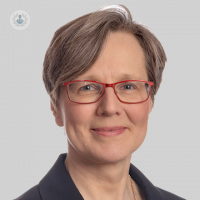When should children have an eye test?
Escrito por:It's really important for children to have regular eye checks to make sure any issues are detected early and treated. Dr Annegret Dahlmann-Noor, an expert paediatric ophthalmologist, gives her advice to parents about getting your child's eyes tested.
All children should have at least the tests which the UK National Screening Committee recommends to ensure eye health and normal vision development. Some children may also benefit from additional eye tests to detect risk factors for amblyopia (‘lazy eye’), as early treatment is associated with better outcomes.
The UK National Screening Committee recommends an eye check at birth and at six weeks of age, and a vision screening test at age 4-5 years, during the Reception Class year. It is the responsibility of the Local Authorities to provide the vision screening test for 4-5 year old children. However, this is not mandatory and Local Authorities in some parts of the UK therefore do not provide it. In addition, children at fee-paying schools and nurseries are not covered by programmes arranged by the Local Authority. As a result, amblyopia can go undetected. Children tend to tell their parents about their vision problem much later, usually at the age of 9-13 years when it is too late to treat amblyopia.
Comprehensive eye and vision assessment
Children younger than 6 years are usually not able to cooperate with the standard vision test carried out by optometrists, yet the critical phase for developing normal vision are the first 6 years of life. Vision testing in younger children is carried out by health care professionals with special training, the orthoptists. Depending on the age of the child, orthoptists use different tests to measure the child’s vision. Orthoptists also assess whether a child has strabismus (squint), and whether the eyes are moving normally. An orthoptic assessment can be followed by a test for glasses and a check of the eye health by an optometrist with enhanced training, or by a paediatric ophthalmologist (eye doctor for children). This comprehensive eye and vision assessment takes place at hospitals or in community child vision clinics.
Vision screening
Vision screening during the Reception Class year is rarely carried out by orthoptists; more commonly, health care assistants or school nurses measure the children’s visual acuity, the ability to recognise small letters, on a letter chart. They refer those who do not meet certain criteria to the nearest hospital- or community-based child vision clinic for a comprehensive eye and vision assessment.
Parent-initiated eye and vision tests
Regardless of the child’s age, children should have their eyes and vision tested if their parents or carers have any concerns. Parents/carers may be concerned about a baby not making eye contact, a white pupil instead of a red pupil reflex on photographs, the eyes turning in or out (squint), the child holding books close to the face, or standing close to the TV, wobbly eyes (nystagmus), abnormal eye movements, or the child bumping into things or being clumsy. In all these situations, the child should have a comprehensive eye and vision assessment by an orthoptist and ophthalmologist.
If you would like to find out more, make an appointment with a specialist.



